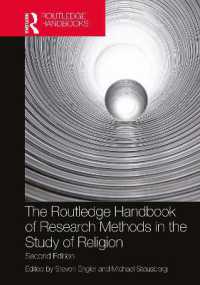- ホーム
- > 洋書
- > 英文書
- > Philosophy
Full Description
Torin Alter presents a compelling defence of the 'knowledge argument' against physicalism, pioneered by Frank Jackson. According to physicalism, consciousness is a physical phenomenon. The knowledge argument stars Mary, who learns all objective, physical information through black-and-white media and yet acquires new information when she first sees colors for herself: information about what it is like to see in color. Based partly on that case, Jackson concludes that not all information is physical. Alter argues that the knowledge argument succeeds in refuting all standard versions of physicalism: versions on which consciousness is grounded by what objective science reveals. Alter also argues that given further, plausible assumptions, the knowledge argument leads to Russellian monism, according to which there are intrinsic properties that both constitute consciousness and underlie properties described by physics, such as mass and charge. Alter explains how the knowledge argument establishes those two conclusions and defend it against numerous objections.
Contents
Part I: The case for the epistemic gap
1: Introduction
2: The significance of structure
3: Structure, physical knowledge, and ignorance
4: Phenomenal knowledge without experience
5: Non-propositional phenomenal knowledge
6: Phenomenal representation
Part II: The case for the modal gap
7: Deduction and necessity
8: Epistemic-modal bridge principles
9: The phenomenal concept strategy and Chalmers's dilemma
10: Consequences of social externalism
11: The conditional analysis of phenomenal concepts
Part III: The case for the ontological gap
12: The supervenience requirement on physicalism
13: Two final objections
14: Two final objections
15: The knowledge argument, Russellian monism, and causal integration
Conclusion








